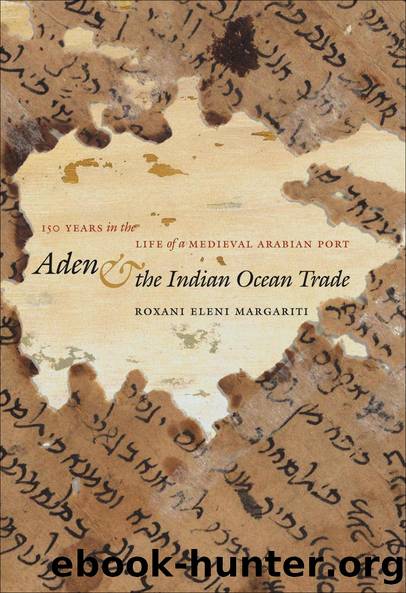Aden and the Indian Ocean Trade by Roxani Eleni Margariti

Author:Roxani Eleni Margariti [Margariti, Roxani Eleni]
Language: eng
Format: epub
Tags: History, Middle East, General, Social Science, Islamic Studies, Europe, Medieval
ISBN: 9781469606712
Google: wvZl0JnEyVsC
Publisher: UNC Press Books
Published: 2012-09-01T16:03:34+00:00
Business Routines
Focusing on the career and status of mercantile representatives in Maá¸mÅ«nâs direct line runs the risk of ignoring the role of other men who were not nagidim but were simply well-respected local merchants performing the basic tasks of a wakÄ«l al-tujjÄr. Two members of the BundÄr clan, Khalaf b. Isaac and Joseph b. Abraham, as well as others of whom the sources provide only fleeting glimpses performed all the routine services associated with mercantile representation; they, too, played a significant role in the smooth operation of trading ventures. Their careers are, in fact, most illuminating for the study of mercantile representation in Aden, permitting the distinguishing of the functions of the institution from the added layer of communal and state involvement that Maá¸mÅ«n and his descendants brought into the picture.
What routine services could a merchant expect from any mercantile representative in Aden, whether that representative was Maá¸mÅ«n or his cousin, Khalaf? A document written by Khalaf and addressed to a well-known merchant and notable, Ḥalfon b. Nathanel, graphically reveals the many ways in which the Adeni merchant managed Ḥalfonâs affairs in Aden while he traveled in India.56 Khalafâs account (ḥisÄb) maintained on Ḥalfonâs behalf starts with credits for merchandise that Ḥalfon had sent to be sold in Aden, including various textiles, pepper, and musk, listing their value and a grand total in Ḥalfonâs favor.57 Khalaf then enumerated various deductions, including
⢠import taxes on some but not all of the merchandise58 (indicating that Khalaf sold only part of the goods and paid taxes from the proceeds);
⢠cost of silver (vessels), gold coins, and coral59 (Khalaf must have bought these on Ḥalfonâs behalf, probably to send to him in India);
⢠rent for a storeroom and the cost of furnishing it with mats (furush)60 (indicating that Khalaf stored some of the goods);
⢠the cost of airing and brushing (sirqa) two types of cloth included on the credits list but not on the tax deductions list61 (items imported but not sold and therefore taxed but instead stored in the rented space; before storage, bales of clothes and fabrics that had traveled across the sea in a damp hold needed to be unwrapped and aired individually).
Download
This site does not store any files on its server. We only index and link to content provided by other sites. Please contact the content providers to delete copyright contents if any and email us, we'll remove relevant links or contents immediately.
| Bahrain | Egypt |
| Iran | Iraq |
| Israel & Palestine | Jordan |
| Kuwait | Lebanon |
| Oman | Qatar |
| Saudi Arabia | Syria |
| Turkey | United Arab Emirates |
| Yemen |
Empire of the Sikhs by Patwant Singh(23073)
The Wind in My Hair by Masih Alinejad(5092)
Rise and Kill First by Ronen Bergman(4779)
The Templars by Dan Jones(4682)
The Rape of Nanking by Iris Chang(4203)
12 Strong by Doug Stanton(3541)
Blood and Sand by Alex Von Tunzelmann(3195)
Babylon's Ark by Lawrence Anthony(2672)
The History of Jihad: From Muhammad to ISIS by Spencer Robert(2620)
No Room for Small Dreams by Shimon Peres(2365)
The Turkish Psychedelic Explosion by Daniel Spicer(2354)
Inside the Middle East by Avi Melamed(2352)
Gideon's Spies: The Secret History of the Mossad by Gordon Thomas(2342)
Arabs by Eugene Rogan(2292)
The First Muslim The Story of Muhammad by Lesley Hazleton(2267)
Come, Tell Me How You Live by Mallowan Agatha Christie(2253)
Bus on Jaffa Road by Mike Kelly(2150)
Kabul 1841-42: Battle Story by Edmund Yorke(2025)
1453 by Roger Crowley(2022)
